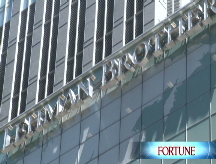Goldman Sachs reports big profit plunge
Earnings sink 70% but beat analyst projections. Stock falls, but CEO insists that firm is 'well positioned' and CFO rules out a merger with a bank for now.
 |
| Goldman Sachs proved it was not invulernable to the ongoing credit crisis as it reported a 70% decline in quarterly profits Tuesday. |
NEW YORK (CNNMoney.com) -- Goldman Sachs reported a sharp decline in profits Tuesday that managed to beat Wall Street's forecasts, but shares of the investment bank fell amid broader fears about the financial services industry.
Just a day after two of Goldman's peers - Lehman Brothers and Merrill Lynch - effectively vanished, Lloyd Blankfein, the company's chief executive officer maintained that Goldman is "well-positioned" to ride out the current credit crunch. Similarly, the firm's finance chief dismissed speculation that the company might look to buy a bank in the near future.
After declining 12% Monday -- one of the company's worst drops of the year as the Dow fell more than 500 points -- Goldman (GS, Fortune 500) shares continued to decline Tuesday, falling 1.8% for the day. It closed at $133.01.
The New York City-based investment bank announced before the opening bell its profits fell 70% to $845 million, or $1.81 a share, during the third quarter ending in August. Just a year ago, the company reported a profit of from $2.85 billion, or $6.13 a share.
Wall Street was expecting a profit of $1.71 a share.
Net revenue tumbled more than 50% to $6.04 billion from $12.3 billion during the same period last year, missing projections of $6.2 billion.
With investment banking activity at a virtual standstill and financial markets in disarray, few were expecting a banner quarter for Goldman. Still, the news damaged the firm's "aura of invulnerability," said Isabel Schauerte, an analyst with Celent, a Boston-based financial research and consulting firm.
"For the time being, the crisis of confidence weighs on the firm's earnings power and may potentially narrow its access to funding," Schauerte wrote in a research note.
Investors were watching Goldman's results carefully in light of the rapidly changing financial landscape.
Fellow investment bank Lehman Brothers (LEH, Fortune 500) filed for bankruptcy Monday, marking the biggest ever in U.S. corporate history.
Merrill Lynch (MER, Fortune 500), a Wall Street icon known for its famous bull logo, also announced plans to be acquired for some $50 billion by Bank of America (BAC, Fortune 500), after enduring billions of dollars in losses as a result of ambitious bets on the U.S. mortgage market.
And there have been increasing fears about the health of the insurance giant American International Group (AIG, Fortune 500).
Goldman chief financial officer David Viniar said during a conference call with analysts that his company did conduct business with both Lehman and AIG, but that both firms posed an "immaterial" risk to their earnings.
But he did hint that Goldman Sachs stood to gain from the recent contraction of Wall Street's inner circle, while offering compassion to his fallen rivals.
"[With] more opportunities and fewer competitors that will help market share and pricing power," said Viniar. "We wish we had more good, strong competitors."
Investors are certain to subject Goldman rival Morgan Stanley (MS, Fortune 500) to similar scrutiny Wednesday when it reports its quarterly results. Analysts expect it to also report a significant decrease in earnings and profits.
In light of the recent turmoil, there has been some speculation that Goldman may also look to merge with or buy a commercial bank.
But during a conference call with analysts, Viniar ruled out the possibility of buying a bank anytime soon.
"We think that the business model we have right now is working quite well and performance is good," Viniar said.
While better than anticipated, Goldman's results were ultimately dinged this quarter by weakness across a number of its business lines, including a decline in client activity.
Investment banking, a cornerstone of the Goldman's business, was one of the hardest hit divisions of the company. Revenues in the division plunged 40% as advisory and underwriting activity stalled during the quarter.
But it was Goldman's trading and principal investment division, which includes the company's equity, fixed income, currency and commodities businesses, that suffered the most. Revenues fell by two thirds during the quarter to $2.7 billion.
Analysts warned ahead of Tuesday's earnings announcement that the division could see signs of strain since Goldman Sachs ties more of its business to the stock market than any of its peers.
Bucking the trend was the company's asset management and securities business, which reported a 4% increase in revenue during the quarter.
Despite this quarter's woes, Goldman continues to remain relatively well capitalized. The company said its Tier 1 capital ratio - a widely used measure of a bank's ability to absorb losses - stood at 11.6%, up from 10.8% in the previous quarter.
A Tier 1 capital ratio of above 8% is generally considered a good sign for financial institutions. ![]()


